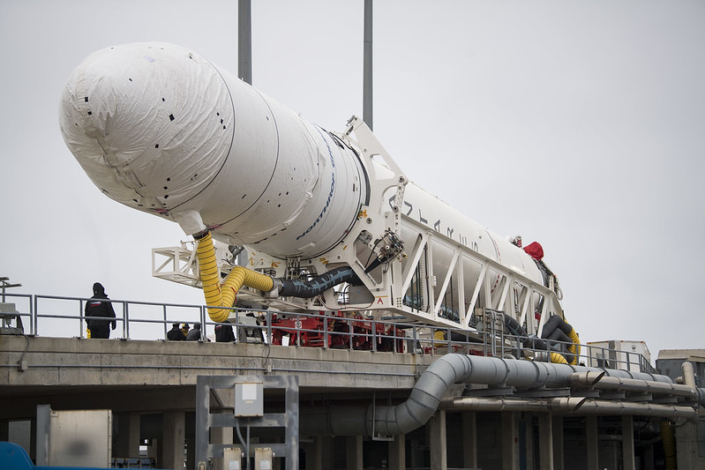
The international race to commercialize and militarize space arguably began in earnest when American astronaut Neil Armstrong first stepped onto the moon on July 20th, 1969, uttering his famous phrase, “That’s one small step for man, one giant leap for mankind.” Now, 53 years later, the latest iteration of that ever-growing space race is playing out in Djibouti, a small east African country that is home to U.S. and Chinese military bases.
China in its bid to dominate infinite outer space is now focused on developing four square miles of sea-level space in the former French colony. Ostensibly, Beijing is claiming the proposed development of a $1 billion spaceport in Djibouti is solely for commercial purposes.
The planned project, according to the memorandum of understanding signed by Djibouti’s President, Ismail Omar Guelleh, Hong Kong’s Aerospace Technology Group Limited (HKATG), and Belgium-based but Chinese-controlled Touchroad International Holdings Group (TIHG), is for the construction of “seven satellite launch pads and three rocket testing pads” in the northern Obock Region of Djibouti. According to Le Monde, a formal agreement is “expected in April or May.”
According to the website Space in Africa, Djibouti would initially lease the future spaceport land to China for “a minimum of 35 years,” with all rights transferring to the Djiboutian government “after 30 years of co-management.” News of the spaceport follows Djibouti’s 2021 commitment to launch two of its own commercial nanosatellites into space.
Commercial benefits to Djibouti aside, HKATG’s lead participation in the project, however, is alarming due to its ties to Huawei, the Chinese conglomerate accused of spying on U.S., Australian, and other American allies’ commercial and military interests. It also opens a pathway to the continued militarization of Djibouti pitting two of the world’s military superpowers against each other.
U.S. involvement in the Horn of Africa region began as a counter-piracy task force aboard the USS Mount Whitney in 2002. Djibouti, strategically located at the opening of the Red Sea into the Gulf of Aden leading to the Indian Ocean, soon became critical in protecting those international shipping lanes – primarily from Somali pirates operating from the coastlines of Somalia east and southeast of Djibouti.
American commitment to the security of Djibouti and the East Africa region expanded when the command of the Combined Joint Task Force – Horn of Africa (CJTF-HOA) was relocated in 2003 to then newly built Camp Lemonnier on the south side of the Djibouti-Ambouli International Airport.
CJTF-HOA’s role has since significantly multiplied beyond Somalian piracy and now is tasked with conducting “operations to enhance partner nation capacity, promote regional stability, dissuade conflict, and promote U.S. and coalition interests.” In this vein, CJTF-HOA’s mission is vital to ensuring our capacity to counter extremists, interdict malign actors, and continue to build upon and expand regional security agreements.
In support of this overall initiative, CJTF-HOA now involves multiple U.S. armed services branches of 23 tenant commands, including U.S. Navy special warfare units, a U.S. Navy Seabee battalion, rotational detachments of U.S. Army Special Forces, and U.S. Air Force units.
Since 2016, however, the U.S. has not been alone in the region. The Chinese People’s Liberation Army Support Base in Djibouti, only several miles away from Camp Lemonnier, is operated by the People’s Liberation Army Navy (PLAN) and is located west of Djibouti city on the Gulf of Tadjoura. Geng Shuang, then the Chinese Foreign Ministry spokesman, claimed the new facility’s purpose was to “escort ships in the Gulf of Aden and the waters off the Somali coast, perform humanitarian rescue, and carry out other international obligations.”
In reality, the Chinese base serves to protect Beijing’s substantial investments in the hemisphere. Not just in Djibouti, but throughout East Africa. Roads, bridges, rails, ports, and most importantly natural resources being mined and sent back to the Chinese mainland to satisfy the West’s growing dependency on Green Energy.
The U.S. military appraisal, then and now, saw it differently. In their mind, the Chinese nearby presence in Djibouti potentially threatened U.S. counter-terrorism operations in Africa and the Middle East – and that Beijing would use their new military installation for surveillance and intelligence gathering purposes on CJTF-HOA activities in East Africa. Then, however, according to a report by the Center for Strategic and International Studies (CSIS), the U.S. military did not deem the Chinese base to be a strategic threat to U.S. interests – or that of its allies.
That was then. This is now.
As it is, China’s Belt and Road Initiative (BRI) is strategically threatening the U.S. in Africa as well as that of its Commonwealth allies, especially the economic interests of the United Kingdom. Beijing’s machinations in Africa are likewise militarily encroaching on U.S. interests and strategic partnerships with its allies as we reported here in National Security News. Now, given the prospect of a nearby Chinese spaceport in Djibouti, those economic and military threats have become extraterrestrial in nature as well.
Yes, on one level, the new Djibouti spaceport is likely intended by Beijing to add to its commercial and military satellite launch capabilities at its Wenchang Satellite Launch Center located in the Hainan province in southern China. Beijing’s space initiatives are in rapid growth mode, including satellite launches, planned missions to the moon, and servicing its Tiangong space station operating in low Earth orbit.
Yet the threat to U.S. national security in Djibouti is now of strategic importance and one that U.S. Space Command will be forced to counter. Spaceports can and do have multiple purposes and undoubtedly Beijing envisions the same for its future facility in Djibouti. One dual purpose is to dominate the U.S. on land and in space when it comes to influencing African nations and their political and business leadership – particularly the Obock Region, which despite being vast, barren, and for the most part undeveloped, provides a strategic overwatch of commercial shipping and military vessels traversing the Red Sea.
Another is to create a strategic global check on the U.S. own commercial global satellite industry, including Elon Musk’s Starlink, while at the same time likely putting into orbit satellite-based weapon systems that can endanger U.S. commercial and military satellites. This potential kinetic risk might also be used to interfere with the U.S. ICBM nuclear launch capabilities – and for increased surveillance purposes.
Space wars, both on land and in the reaches of outer space above us have come to Djibouti. Perhaps, ironically, in one of the most unlikely of places across the globe as two of the world’s superpowers jostle for influence in East Africa. Yet Djibouti should be forewarned. One small step for Beijing, may decidedly not be one giant leap forward for Djibouti. Plus, if unchecked, it could also represent one massive giant step backward for the U.S. and its global democratic allies and partners.
Copyright 2023. Mark C. Toth and Jonathan E. Sweet. All rights reserved.
Mark Toth is a retired economist and entrepreneur who has worked in banking, insurance, publishing, and global commerce. He is a former board member of the World Trade Center, St. Louis, and has lived in U.S. diplomatic and military communities around the world, including London, Tel Aviv, Augsburg, and Nagoya. Follow him on Twitter @MCTothSTL.
Jonathan Sweet, a retired Army colonel, served 30 years as a military intelligence officer. His background includes tours of duty with the 101st Airborne Division and the Intelligence and Security Command. He led the U.S. European Command Intelligence Engagement Division from 2012-14, working with NATO partners in the Black Sea and Baltics. Follow him on Twitter @JESweet2022.















































































































































































